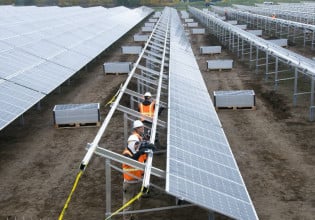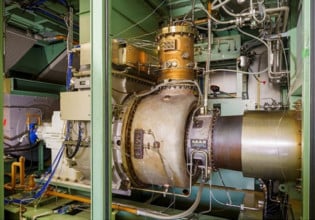GeneSiC Wins Receives Funds To Develop of Silicon Carbide Thyristor-based Devices
Advanced Research Projects Agency – Energy (ARPA-E) has entered into a Cooperative Agreement with the GeneSiC Semiconductor-led team towards the development of the novel ultra high-voltage silicon carbide (SiC) Thyristor based devices. These devices are expected to be key enablers for integrating large-scale wind and solar power plants into the next-generation Smart Grid.
"This highly competitive award to GeneSiC will allow us to extend our technical leadership position in the multi-kV Silicon Carbide technology, as well as our commitment to grid-scale alternative energy solutions with solid state solutions," commented Dr. Ranbir Singh, President of GeneSiC. "Multi-kV SiC Thyristors we’re developing are the key enabling technology towards the realization of Flexible AC Transmission Systems (FACTS) elements and High Voltage DC (HVDC) architectures envisaged towards an integrated, efficient, Smart Grid of the future. GeneSiC’s SiC-based Thyristors offer 10X higher voltage, 100X faster switching frequencies and higher temperature operation in FACTS and HVDC power processing solutions as compared to conventional Silicon-based Thyristors."
In April 2010, GeneSiC responded to the Agile Delivery of Electrical Power Technology (ADEPT) solicitation from ARPA-E that sought to invest in materials for fundamental advances in high voltage switches that has the potential to leapfrog existing power converter performance while offering reductions in cost. The company’s proposal titled "Silicon Carbide Anode Switched Thyristor for medium voltage power conversion" was selected to provide a lightweight, solid-state, medium voltage energy conversion for high power applications such as solid-state electrical substations and wind turbine generators. Deploying these advanced power semiconductor technologies could provide as much as a 25-30% reduction in electricity consumption through increased efficiencies in delivery of electrical power. Innovations selected were to support and promote U.S. businesses through technological leadership, through a highly competitive process.
Silicon carbide is a next-generation semiconductor material with vastly superior properties to conventional silicon, such as the ability to handle ten times the voltage-and one-hundred times the current-at temperatures as high as 300°C. These characteristics make it ideally suited to high-power applications such as hybrid and electric vehicles, renewable energy (wind and solar) installations, and electrical-grid control systems.
It is now well established that ultra-high voltage (more than 10kV) Silicon Carbide (SiC) device technology will play a revolutionary role in the next-generation utility grid. Thyristor-based SiC devices offer the highest on-state performance for more than 5 kV devices, and are widely applicable towards medium voltage power conversion circuits like Fault-Current Limiters, ac-dc converters, Static VAR compensators and Series Compensators. SiC based Thyristors also offer the best chance of early adoption due to their similarities to conventional power grid elements.
Other promising applications and advantages for these devices include: power-management and power-conditioning systems for Medium Voltage DC conversion sought under Future Naval Capability (FNC) of US Navy, Electro-magnetic launch systems, high energy weapon systems and medical imaging. The 10-100X higher operating frequency capability allows unprecedented improvements in size, weight, volume and ultimately, cost of such systems. A variety of energy storage, high-temperature and high-energy physics applications. Energy storage and power grid applications are receiving increasing attention as the world focuses on more efficient and cost-effective energy-management solutions.
"We’ve emerged as a leader in ultra-high voltage SiC technology by leveraging our core competency in device and process design with an extensive suite of fabrication, characterization, and test facilities," concluded Dr. Singh. "GeneSiC’s position has now been effectively validated by the US DOE with this significant follow-on award."






